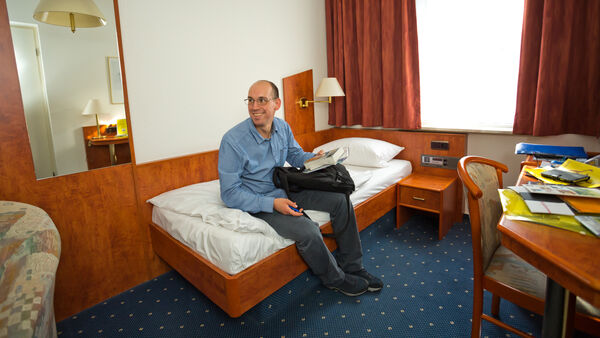Daring to Sleep Cheap
By Rick Steves
Europe offers a wide range of accommodations: hotels (from small to large, and simple to swanky), cozy B&Bs, characteristic guest houses, cheap hostels, and rental apartments, plus creative accommodations such as monasteries, campgrounds, free couches, house-swaps, and even airport sofas. There's certain to be a perfect home-away-from-home for you.
Finding the Right Room
Whether you're booking accommodations for your entire trip months in advance, or rolling into town after dark and finding a room on the fly, these tips will help you choose what's best for you and your budget.
People often ask me how I choose which hotels to list in my guidebooks. There's no secret trick to it: I walk through the most inviting neighborhood in town, snoop around each hotel and grab their price lists, and jot down some notes. By the end of the day, the best-value hotels stand out. What's striking to me is how little correlation there is between what you pay and what you get. I recently spent a day in Amsterdam, scaling the stairs and checking out the rooms of 20 different hotels, all offering double rooms for $100–230 a night. What I found is that you are just as likely to spend $150 for a big, impersonal place on a noisy highway as you are to spend $100 for a charming, family-run guesthouse on a bikes-only stretch of canal.
I look for places that are clean, central, relatively quiet at night, reasonably priced, friendly, small enough to have a hands-on owner and stable staff, run with a respect for local traditions, and not listed in other guidebooks. If I can find a place with, say, six of these eight criteria, it's a keeper. I'm more impressed by a convenient location and a fun-loving philosophy than flat-screen TVs and pricey laundry service.
It pays to choose your accommodations thoughtfully. Expensive hotels can rip through a tight budget like a grenade through a dollhouse. I hear people complaining about that "$300 double in Frankfurt" or the "$400-a-night room in London." They come back from their vacations with bruised and battered pocketbooks, telling stories that scare their friends out of international travel and back to Florida or Hawaii one more time. True, you can spend $400 for a double, but I never have. That's three days' accommodations for me.
As far as I'm concerned, spending more for your hotel just builds a bigger wall between you and what you traveled so far to see. If you spend enough, you won't know where you are. Think about it. "In-ter-con-ti-nen-tal." That means the same everywhere — designed for people who deep-down inside wish they weren't traveling, people spending someone else's money, people who need a strip of paper over the toilet promising them no one's sat there yet. It's uniform sterility, a lobby full of stay-press Americans, English menus, and lamps bolted to tables.
Europe's small, mid-range hotels may not have room service, but their staffs are more interested in seeing pictures of your children and helping you have a great time than in thinning out your wallet.


